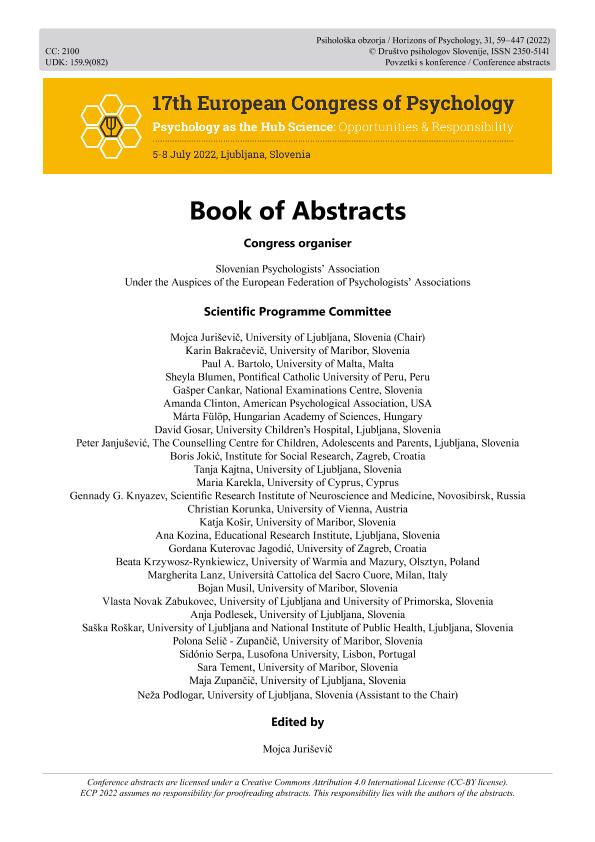Mostrar el registro sencillo del ítem
dc.contributor.author
González Ponce, Bella
dc.contributor.author
Carmona Márquez, José
dc.contributor.author
Vera, Belén del Valle

dc.contributor.author
Pautassi, Ricardo Marcos

dc.contributor.author
Fernández Calderón, Fermín

dc.date.available
2023-09-26T11:54:42Z
dc.date.issued
2022
dc.identifier.citation
The Protection Motivation Theory as a Predictor of the Use of Protective Behavioral Strategies among Young Adults; 17th European Congress of Psychology; Liubliana; Eslovenia; 2022; 379-379
dc.identifier.issn
2350-5141
dc.identifier.uri
http://hdl.handle.net/11336/213019
dc.description.abstract
Alcohol Protective Behavioral Strategies (PBS) have shown to be effective in minimizing alcohol-related negative consequences. However, previous studies on the explanatory factors of PBS use are scarce. The Protection Motivation Theory (PMT) is a social cognition theory which attempts to explain intention to use protective behaviors in respond to health threats such as alcohol-related negative consequences. According to PMT, the likelihood of engaging in protective behaviors when facing a threat is a product of two processes: threat appraisal (perceived severity and perceived vulnerability to the threat) and coping appraisal (response efficacy and perceived self-efficacy for using a protective behavior). We examined the predictive utility of the PMT on the intention to use PBS related to the Manner of Drinking (MOD) among a community sample of young adults. Prospective study that recruited 360 young adults aged 18-24 years by targeted sampling procedure (Mage=21.15 [SD=2.23]; female=50.3%). Most baseline participants (94.2%, n=339) completed a 2-months follow-up assessment. Perceived severity and perceived vulnerability to alcohol use, perceived efficacy of MOD strategies to reduce alcohol-related negative consequences, and self-efficacy to engage in MOD strategies were measured at baseline, and intention to use MOD strategies at follow-up. A multiple lineal regression model for predicting intention to use MOD strategies was used. Perceived severity (β=.13, p=.017), response efficacy (β=.270, p<.001), and selfefficacy (β=.240, p<.000) were positively associated with high intention to use MOD protective strategies. In line with previous research, our findings demonstrated that coping-appraisal components of PMT are more explanatory of protective behaviors than threat-appraisal components. These results may be useful to inform interventions aimed at increasing PBS use among young adults.
dc.format
application/pdf
dc.language.iso
eng
dc.publisher
Slovenian Psychologists' Association
dc.rights
info:eu-repo/semantics/openAccess
dc.rights.uri
https://creativecommons.org/licenses/by/2.5/ar/
dc.subject
PROTECTION MOTIVATION THEORY
dc.subject
PROTECTIVE BEHAVIORAL STRATEGIES
dc.subject
YOUNG ADULTS
dc.subject.classification
Otras Psicología

dc.subject.classification
Psicología

dc.subject.classification
CIENCIAS SOCIALES

dc.title
The Protection Motivation Theory as a Predictor of the Use of Protective Behavioral Strategies among Young Adults
dc.type
info:eu-repo/semantics/publishedVersion
dc.type
info:eu-repo/semantics/conferenceObject
dc.type
info:ar-repo/semantics/documento de conferencia
dc.date.updated
2023-09-15T11:09:13Z
dc.journal.volume
31
dc.journal.pagination
379-379
dc.journal.pais
Eslovenia

dc.journal.ciudad
Liubliana
dc.description.fil
Fil: González Ponce, Bella. Universidad de Huelva; España
dc.description.fil
Fil: Carmona Márquez, José. Universidad de Huelva; España
dc.description.fil
Fil: Vera, Belén del Valle. Universidad Nacional de Córdoba. Instituto de Investigaciones Psicológicas. - Consejo Nacional de Investigaciones Científicas y Técnicas. Centro Científico Tecnológico Conicet - Córdoba. Instituto de Investigaciones Psicológicas; Argentina
dc.description.fil
Fil: Pautassi, Ricardo Marcos. Universidad Nacional de Córdoba. Facultad de Psicología; Argentina. Consejo Nacional de Investigaciones Científicas y Técnicas. Centro Científico Tecnológico Conicet - Córdoba. Instituto de Investigación Médica Mercedes y Martín Ferreyra. Universidad Nacional de Córdoba. Instituto de Investigación Médica Mercedes y Martín Ferreyra; Argentina
dc.description.fil
Fil: Fernández Calderón, Fermín. Universidad de Huelva; España
dc.relation.alternativeid
info:eu-repo/semantics/altIdentifier/url/http://psiholoska-obzorja.si/en/article?id=551
dc.relation.alternativeid
info:eu-repo/semantics/altIdentifier/url/http://psiholoska-obzorja.si/arhiv_clanki/2022/ECP_2022_Abstracts.pdf
dc.conicet.rol
Autor

dc.conicet.rol
Autor

dc.conicet.rol
Autor

dc.conicet.rol
Autor

dc.conicet.rol
Autor

dc.coverage
Internacional
dc.type.subtype
Congreso
dc.description.nombreEvento
17th European Congress of Psychology
dc.date.evento
2022-07-05
dc.description.ciudadEvento
Liubliana
dc.description.paisEvento
Eslovenia

dc.type.publicacion
Journal
dc.description.institucionOrganizadora
lovenian Psychologists’ Association
dc.source.revista
Horizons of Psychology
dc.date.eventoHasta
2022-07-08
dc.type
Congreso
Archivos asociados
